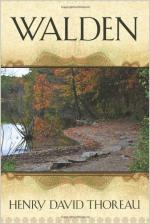|
|
Walden Objects/Places
Walden Pond: The pond in Concord, Massachusetts on which Thoreau built his cabin and squatted for two years.
The Hollowell Place: A farm which Thoreau bought before he began his time at Walden. He had just begun to plant a garden when the former owner's wife asked for the place back. Thoreau rejected the ten dollars the former owner offered him in return for the farm.
Concord: The town in Eastern Massachusetts in which Walden Pond was located. Also the sight of the first battle of the Revolutionary War.
Fitchburg Railroad: Train line that runs along one edge of Walden Pond, to and from Boston on a daily basis. It carries both people and freight.
Lexington: A town bordering Concord, also the sight of the first battle of the Revolutionary War.
Sudbury, Acton, Bedford and Weston: All towns bordering, or in the vicinity of, Concord.
Peterboro's Hills: An area in Southern New Hampshire, visible from Concord.
White Pond: A pond located in Nine Acre Corner, in Concord, which Thoreau felt was as pure and clean as Walden, and probably more pristine and beautiful. May be connected to Walden by underground springs. Thoreau calls these two ponds 'Lakes of Light.'
Saffron Walden: An English locality that may have been the origin for the name Walden, though Thoreau also thought Walden came from 'Walled-in' because of the rocks lining the entire shore of the pond.
Fair Haven: A bay in the Sudbury River, near Walden Pond.
Flint's Pond (Sandy Pond): A nearby pond in Lincoln which appears to be connected to Walden by a series of small ponds.
Goose Pond: A small pond in between Walden and Flint's Ponds.
Baker Farm: A farm about a mile from Walden where Thoreau considered living before he chose Walden.
Breed's Hut: The long unoccupied cabin that was the subject of many local ghost stories, as well as an old, possibly fictional tavern. The son of a former inhabitant comes to the house after it is burnt down by local kids, and meets Thoreau by chance.




